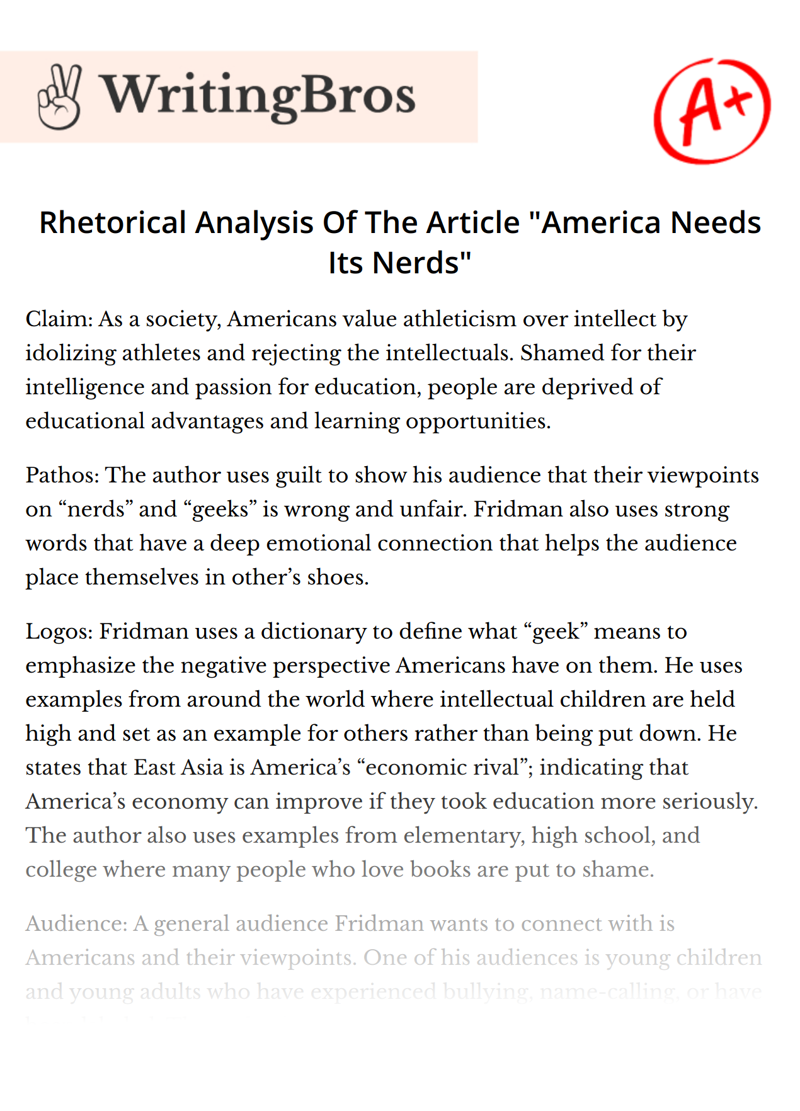Rhetorical Analysis Of The Article "America Needs Its Nerds"

Claim: As a society, Americans value athleticism over intellect by idolizing athletes and rejecting the intellectuals. Shamed for their intelligence and passion for education, people are deprived of educational advantages and learning opportunities.
Pathos: The author uses guilt to show his audience that their viewpoints on “nerds” and “geeks” is wrong and unfair. Fridman also uses strong words that have a deep emotional connection that helps the audience place themselves in other’s shoes.
Logos: Fridman uses a dictionary to define what “geek” means to emphasize the negative perspective Americans have on them. He uses examples from around the world where intellectual children are held high and set as an example for others rather than being put down. He states that East Asia is America’s “economic rival”; indicating that America’s economy can improve if they took education more seriously. The author also uses examples from elementary, high school, and college where many people who love books are put to shame.
Audience: A general audience Fridman wants to connect with is Americans and their viewpoints. One of his audiences is young children and young adults who have experienced bullying, name-calling, or have been labeled. The author’s audience also consists of adults/parents who idolize athletes and shun the intellectually serious.
I agree with Fridman’s claim because I do not believe in labeling and creating names for those who love education or are passionate about any subject. American society does value athleticism more than the intellectually serious. Education is one of many major keys to success and people are constantly encouraging others to get an education. On the other hand, when nerds and geeks love to learn and seek knowledge, they are put down and shamed for it. I believe his assumptions are correct because it is seen in schools, movies, and workplaces. Americans have created an image of what a “nerd” is, and how they are usually treated. Thick glasses, acne, and a certain haircut make up what a “nerd” is, and they are usually bullied for loving books or school. The author assumes Americans dislike and undervalue geeks because they do not fit within the image of what a standard American should look like. I disagree with America’s perception of geeks and nerds because anyone can be a nerd without having glasses or dressing a certain style. People can love education as much as they love sports. I do not believe his claim is exaggerated because this concept is seen throughout all our lives. Children from a young age are taught that being a nerd is a negative trait to have. Parents discourage their children when they prefer to read than going out to a party or socializing. The author uses worldwide examples from other countries where being a “nerd” is a positive idea. They are held up and set as an example for other students which I believe is a great way to encourage students and people to be themselves. I strongly believe people should embrace who they are and what they love, even if that means more studying and less partying.
Researcher and author, Leonid Fridman, in his article, “America Needs Its Nerds” (1990), argues that Americans value athleticism more than education and the intellectually curious, which deprives many from learning opportunities and restricts people from being themselves. He supports his claim by first defining what a “geek” means from a dictionary and proving how terribly people perceive geeks, then he establishes how children from a young age are put down when they prefer to read or build a model airplane, and he finally proceeds to use examples from around the world other than America, where being intelligent and loving education is a positive concept and students are set as examples for others. Fridman’s purpose is to bring awareness about how poorly the American society perceives the intellectually serious or “nerds” and how they value athleticism in order to achieve a different perspective on how important and valuable “nerds” are in society. He establishes a serious, respectful, and valid tone for his worldwide audience, but particularly Americans, young and adults, who are sport lovers or live in an environment where being a “nerd” is a negative concept.
Cite this Essay
To export a reference to this article please select a referencing style below

